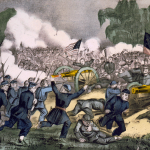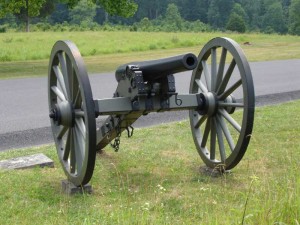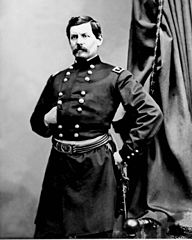Acoustic Shadow (sometimes called Silent Battle) is a strange thing. It is a circumstance where sound is unheard close to the cause of the sound, but the same sound is heard a far distance away from its source.
With a unique combination of factors such as wind, weather, temperature, land topography, elevation, forest or other vegetation, battle sounds are not heard at a distance they normally would be heard clearly.
Acoustic Shadow Can Hurt Battle Communication
The distance the sound of battle is heard may be great, even hundreds of miles, yet nearby and sometimes only mere miles away the sounds are not heard. Battles where Acoustic Shadow occurred in the Civil War are Gettysburg, Seven Pines, Iuka, Fort Donelson, Five Forks, Perryville, and Chancellorsville.
Acoustic Shadow could have a profound effect on a battle. During the Civil War it was common for armies to be spread out over large distances and timely communication between the split parts of an army was crucial to battlefield success.Army commanders must make decisions based on current knowledge of the situation before them. The sounds of a battle would be a form of communication, signaling to a Civil War commander and his staff where a battle is taking place, and what troops (including the enemy) may be involved.
If Acoustic Shadow hides battle action from being heard by a commander, then communication has been lost and dire consequences may follow as the commander does not respond as needed to the battlefield situation.
Acoustic Shadow During Civil War Battles
- The Battle of Gettysburg – The battle sounds from Gettysburg could be heard over one hundred miles away in Pittsburgh, but were not heard only ten miles from the battlefield.
- Battle of Gaines’s Mill – More than 91,000 men were engaged in battle at Gaines’s Mill, Virginia on June 27, 1862. Confederate commanders and troops were less than two miles from the battlefield and could plainly see the smoke and flashes from the guns and artillery, but not a sound could be heard of the battle for two hours. Strangely, the battle sounds from the Battle of Gaines’s Mill were easily heard in Staunton, Virginia over one hundred miles away.
- Five Forks – Fives Forks was part of the Appomattox Campaign and fought from March 30 to April 1, 1865. Confederate Generals George Pickett and Fitzhugh Lee were enjoying a shad bake with other generals north of Hatcher’s Run when the battle of Five Forks began a short distance away. Because of Acoustic Shadow, Pickett and Fitzhugh Lee were unaware a fight was under way. Pickett finally responded, but arrived late for the battle. Pickett and Fitzhugh Lee have been criticized by Civil War historians (please see Lee’s Lieutenants, III, 665-670) for not acting on “the dread immediacy of the crisis” (ibid., 665) at Five Forks.
Descriptions of Acoustic Shadow During The Civil War
The many volumes of the Battles and Leaders of the Civil War series documents the Civil War with first-hand account writings of Union and Confederate officers. On page 365 of Volume 2 an article titled “THE CAUSE OF SILENT BATTLE,” by Professor John B. De Motte of De Pauw University offers a description Acoustic Shadow phenomenon. Below is an excerpt from De Motte’s article:
“THE CAUSE OF A SILENT BATTLE
“By Professor John K. De Motte, De Pauw University, Ind.
“REFERENCE has been made to the supposed effect of the wind in preventing, as in the case of the heavy cannonading between the Merrimac and Congress, the transference of sound-waves a distance of not over three and one-half miles over water; and at another time, during the bombardments of the Confederate works at Port Royal, a distance of not more than two miles. ” The day was pleasant,” says the writer, ” and the wind did not appear unusually strong.” Yet ” people living in St. Augustine, Florida, told me afterward that the Port Royal cannonade was heard at that place, 150 miles from the fight.”
“It occurs to me that the effect of the wind is greatly exaggerated in these instances. How an ordinary breeze could “carry all sounds of the conflict away from people standing within plain sight of it” and yet carry the same sound 150 miles in the opposite direction, is rather too strongly opposed to scientific fact to remain on record undisputed.
“In all of these cases, is it not probable that the varying density of the air had much more to do with this strange acoustic opacity than the wind?
“These statements call to mind the prevalent belief that fog, snow, hail, and rain, indeed, any conditions of the atmosphere that render it optically opaque, render it also acoustically opaque; which, up to the time of Mr. Tyndall’s experiments in the English Channel, off Dover, had scarcely been questioned. His tests made in 1873-74 proved conclusively, as is now well known, that on clear days the air may be composed of differently heated masses, saturated in different degrees with aqueous vapors, which produce exactly the deadening effects described above.
“I submit as a case in point a similar effect, and its explanation as furnished by Mr. R. G. H. Kean to Professor Tyndall, and considered by the latter of sufficient value to find a place in his published works:
“‘On the afternoon of June 27th, 1862, I rode, in company with General G. W. Randolph, then Secretary of War of the Confederate States, to Price’s house, about nine miles from Richmond. The evening before General Lee had begun his attack on McClellan’s army, by crossing the Chickahominy about four miles above Price’s, and driving in McClellan’s right wing.
“‘The battle of Gaines’s Mill was fought the afternoon to which I refer. The valley of the Chickahominy is about one and a half miles wide from hill-top to hill- top. Price’s is on one hill-top, that nearest to Richmond: Gaines’s farm, just opposite, is on the other, reaching back in a plateau to Cold Harbor.
“‘Looking across the valley, I saw a good deal of the battle, Lee’s right resting in the valley, the Federal left wing the same. My line of vision was nearly in the line of the lines of battle. I saw the advance of the Confederates, their repulse two or three times, and in the gray of the evening the final retreat of the Federal forces. I distinctly saw the musket-fire of both lines, the smoke, individual discharges, the flash of the guns. I saw batteries of artillery on both sides come into action and fire rapidly. Several field-batteries on each side were plainly in sight. Many more were hid by the timber which bounded the range of vision.
“‘Yet looking for nearly two hours, from about 5 to 7 P. M. on a midsummer afternoon, at a battle in which at least 50,000 men were actually engaged, and doubtless at least 100 pieces of field-artillery, through an atmosphere optically as limpid as possible, not a single sound of the battle was audible to General Randolph and myself. I remarked it to him at the time as astonishing.
“‘Between me and the battle was the deep, broad valley of the Chickahominy, partly a swamp shaded from the declining sun by the hills and forest in the west (my side). Part of the valley on each side of the swamp was cleared: some in cultivation, some not. Here were conditions capable of providing several belts of air, varying in the amount of watery vapor (and probably in temperature), arranged like laminae at right angles to the acoustic waves as they came from the battle-field to me.'”
There are footnotes to the above article in Battles and Leaders of the Civil War. Below is an excerpt from one of the footnotes. This excerpt provides us with more information about the Acoustic Shadow phenomenon. The footnote references its source of information as being an article which was included in the “Southern Bivouac” of May 1887 by General E. M. Law of the Army of Northern Virginia. General E. M. Law writes about the Acoustic Shadow phenomenon at the battle of Gaines’ Mill:
“To the troops stationed near the river, on the Richmond side, the action at Gaines’ Mill was plainly visible, that part of it, at least, which took place in the open ground. I have been told by an eye-witness that from Price’s house, on the opposite side, he could distinctly see the Confederate lines advancing to the attack through the open ground beyond the Chickahominy swamp, and could distinguish the direction of the lines of battle by the volume of smoke arising from the woods farther to the Confederate center and left. But it was all like a pantomime, not a sound could be heard, neither the tremendous roar of the musketry nor even the reports of the artillery.”




